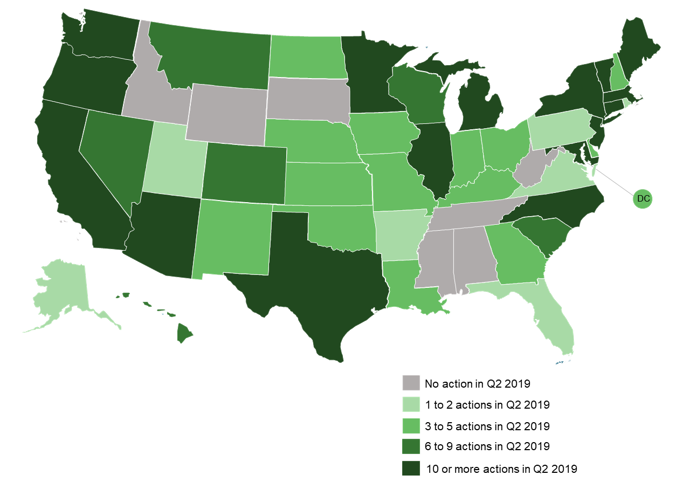The 50 States of Electric Vehicles: States Focus on Transportation Electrification Planning, Charging Station Regulation in Q2 2019
Raleigh, N.C. – (August 7, 2019) The N.C. Clean Energy Technology Center (NCCETC) released its Q2 2019 update edition of The 50 States of Electric Vehicles. The quarterly series provides insights on state regulatory and legislative discussions and actions on electric vehicles and charging infrastructure.
The report finds that 43 states and the District of Columbia took actions related to electric vehicles and charging infrastructure during Q2 2019 (see figure below), with the greatest number of actions relating to rebate programs, additional registration fees, and charging station deployment.
A total of 425 electric vehicle actions were taken during Q2 2019 – a 55% increase over the second quarter of last year. The report discusses three trends in electric vehicle actions taken in Q2 2019: (1) states establishing guidelines for utility transportation electrification plans, (2) states exempting electric vehicle charging stations from public utility regulation, and (3) policymakers setting targets for zero-emission or electric state fleet vehicles.
Q2 2019 State and Utility Action on Electric Vehicles

“A growing number of states are electing to exempt at least some electric vehicle charging stations from regulation as public utilities, but approaches have differed on the finer policy details, such as whether to allow charging stations to use electricity generated on-site,” observed David Sarkisian, Senior Policy Analyst at NCCETC.
The report notes five of the top policy developments of the quarter:
- The Vermont Public Utility Commission completing its electric vehicle study, and Vermont legislators initiating a new study;
- Regulators approving electric vehicle programs for Pepco, Delmarva, and DTE;
- Minnesota utilities filing transportation electrification plans;
- Hawaii and Maine lawmakers approving new electric vehicle rebate programs; and
- Seven states – Kentucky, Iowa, Missouri, Montana, New Mexico, North Carolina, and Vermont – exempting charging stations from public utility regulation.
“Transportation electrification is continuing to gain attention from policymakers, regulators, and utilities,” noted Autumn Proudlove, Senior Manager of Policy Research at NCCETC. “Several states are now directing utilities to file transportation electrification plans, and providing guidance for these plans, in order to advance state policy goals.”
View the 50 States of Electric Vehicles Q2 2019 Executive Summary
View and Purchase the 50 States of Electric Vehicles Q2 2019 update FULL Report
View other 50 States Reports – Solar, Grid Modernization and Electric Vehicles
ABOUT THE N.C. CLEAN ENERGY TECHNOLOGY CENTER
The N.C. Clean Energy Technology Center, as part of the College of Engineering at North Carolina State University, advances a sustainable energy economy by educating, demonstrating and providing support for clean energy technologies, practices and policies. It serves as a resource for innovative, sustainable energy technologies through technology demonstration, technical assistance, outreach and training. For more information about the Center, visit: http://www.nccleantech.ncsu.edu. Twitter: @NCCleanTech
MEDIA CONTACT: Shannon Helm, NCCETC, shannon_helm@ncsu.edu